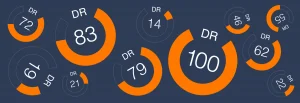What is a Domain Rating DR?
Test your domain authority according to Ahrefs Domain Rating DR Score checking website. It’s a Free bulk domain rating Checker software, found directly on Ahref’s Website’s domain rating page.
You do not need to create an account or purchase a subscription to check your website’s Domain URL rating. The website’s domain Rating is an essential subject for Google’s algorithm to allow the website to rank on search engines.
Backlinks are essential to get good results from a website. It’s important to create a compelling profile to build backlinks. The higher the backlink profile, the higher you will rank as your website will be. What are these questions? Can backlinking be measured in real-time and accurately? Ahrefs has an assessment system for this, which he calls Website Ratings.
How do we calculate our Domain Rating Score?
Calculating your Domain Rating Score may initially seem confusing, but understanding how it works can significantly improve your website’s SEO and reach. When you submit a domain for review, the system uses 40 different signals to rank the overall quality of your website.
This score is known as the Domain Rating Score and is calculated by analyzing thousands of links to your website, specifically their relevance, authority and trustworthiness. The result gives a detailed overview of the popularity of your domain across major search engines. It’s an essential measure of success when aiming for an effective digital marketing strategy – so stay up-to-date on this score!
DR are measures that measure external links from other websites. How do we estimate these indices? Check how many unique domain URLs are linked to the target site. Please find details of the DR on our website.
Free Domain Rating Checker Tool
When calculating the DR in your algorithm is time-consuming. SEO professionals may provide a variety of SEO software to the public.
Moz & SEMrush also offer a tool to check domain authority. Pick one and apply it regularly. For each of them, the URLs of each page will show the backlink profiles on the page and the domain rating.
Why the “authority” of your domain matters
Google has consistently denied that “domain authority” was used for ranking purposes. Google said the scores were similar to those found by other searchers and similar in many respects.
When comparing domain rank to keywords on 218,000 domains, we found the results were good for both. DR is a helpful metric for assessing the ability of websites to receive organic traffic on Google.
Disclaimer: This is a correlation test. The evidence for causality is not proven.
Dns rating is an Ahrefs proprietary measure that compares your site’s “link’s popular” to the rest of the website. This is the strength of a website’s backlink profile and is assessed on an arithmetic scale of 1, to 100, with the first being more substantial.
Domains of websites can be a significant indicator of Ahrefs that you can read almost everything they report. Many folks look at these websites religiously to see how well it works for the link.
What is a good DR (authority) score?
The bigger the authority, the more. DR should be considered, not just domain ratings alone. Domain ratings are relative metrics by definition. DR over 30 cannot be said to be as good as 50 or 60.
This is relative. Your DR (authority) should be excellent for sites higher than similar sites and comparable.
How to improve your Domain Rating (i.e., “authority” score)
Backlinks are necessary if your site needs help improving your Domain Ranking. However, improving a website’s credibility can be a challenge in itself. Instead, it would be best to aim to gain backlinks from good pages in your industry to pages you wish to list in search results on Google.
The result is the direct correlation between the number of referred pages on a website and the amount of traffic. Relationships between domain references and search traffic – study 92 million pages.
Get an SEO strategy template with 100% customization. Analyze the effectiveness of your online marketing campaigns using data such as link profile URLs and root domains. Check out the template in action.
Build a high-quality backlink strategy.
You must develop content marketing and link-building strategies for the high-authority website. Your site must have good links to top-ranking sites. Conduct keyword research, create high-level articles, and write guest posts.
How do you determine domain rating?
DR was calculated by comparing several aspects, including links from the site to its content. Quality links are essential for the website. The higher the DR, the higher your Google rankings are.
What is the highest domain rating?
Moz has a domain authority scale of between 1 and 900. One of these is the lowest, and 100 is the best. Often companies believe in a domain score of 100 because it is the highest score possible.
What is a good domain rating?
Your domain rating is essential for successful search engine optimization (SEO). This metric, also known as Domain Authority Score (DAS), allows you to compare website domains on a scale from 0-100 and better understand how strong those domains are considered to be.
A good domain rating is typically anything above 50, although achieving a higher score should always be the goal if you want maximum exposure for your site. A good domain rating indicates that your site has high-quality content or HTML structure and that significant search engines can trust it and rank highly in their results.
How do you determine domain rating?
Domain rating, or DR, is a metric designed to measure the strength of a website compared to other websites on the Internet. It determines the likelihood of it being listed in top search engine rankings.
DR helps to compare domain authority across different sites and track SEO performance. This rating ranges from 0 to 100, with higher numbers indicating more reliable content and larger websites scoring in the higher range of this scale.
For your site to be successful online and receive increased traffic, it’s essential to monitor and improve your Domain Rating by regularly analyzing data from various sources.
What is the highest domain rating?
The highest domain rating indicates the overall quality of a website and is based on various measures. It serves as an essential metric to determine a business’s online visibility and success, allowing businesses to understand how successful their website has been compared to similar businesses.
According to Moz, the highest possible domain rating is 99/100. However, this is rarely achievable due to how hard it is for websites to achieve such excellence in external backlinks and other relevant ranking factors.
However, reaching a domain rating above 90 can have significant benefits for those websites that manage to do so – with rewards like increased organic visibility and higher search engine rankings.
What are domain rating and URL rating?
Domain and URL ratings are essential for search engine optimization (SEO). Domain ratings measure the authority, strength and trustworthiness of a website. Likewise, URL ratings measure the overall quality of individual web pages.
A website’s domain rating is based on link profile, backlinks, traffic, social media signal, etc. Likewise, a page’s URL rating is based on text formatting, meta tags, keyword density and internal linking structure.
An optimized domain rating and URL rating can benefit your website with higher search engine rankings, increased visibility and greater visitor trust.
Space/Domain Authority (DA) is a web placement score created by Moz that predicts how likely a website is to be placed in web search engine results pages (SERPs). Space Authority scores range from one to 100, with higher scores being associated with a higher likelihood of placement.
What is Link Explorer web?
Space/Domain Authority depends on information from our Link Explorer web list and uses many elements in its calculations. The true Domain Authority estimate itself uses an AI model to look ahead as a “best-fit” calculation that most accurately matches our link information with rankings across many real search terms that we use as norms for comparison.
Domain rating vs Domain authority
Domain rating and domain authority measure the overall influence of a website, but in different ways. Domain rating assesses the overall volume and quality of backlinks to a website, factoring in the strength of those links.
Domain authority, on the other hand, uses a complex algorithm to measure how likely it is that a website will rank highly in search engine result pages. Both are essential metrics for SEO professionals and business owners looking to track their website performance. Ultimately, both domain ratings and domain authorities provide insight into how effectively a given website drives traffic.
Difference between domain rating and domain authority
Domain rating and domain authority are two essential metrics often used to measure the strength of a website in terms of offsite SEO. Although they can be used together in SEO strategies, they’re not interchangeable.
Domain rating is based on a website’s link profile as determined by keyword-agnostic data processing. In contrast, domain authority considers multiple factors, including linking root domains, the number of total links, and MozRank.
Both measurements can be helpful when assessing and improving a website’s search engine ranking potential, but it’s essential to understand the distinction between them. With some practice, both metrics can be integrated into your exploratory analysis process to help get an overall sense of a website’s visibility with search engines.
What is the DA score?
Space/Domain Authority is determined by evaluating several variables, including connecting root domains and a full count of connections, in a single DA score. This value can then be used when looking at websites or tracking the “positioning strength” of a website after some time.
How to calculate a domain's DA score?
Since the Domain Authority 2.0 update in mid-2019, the calculation of a domain’s DA score is based on an AI calculation’s expectations of how frequently Google uses that domain in its listings. If you assume that domain and shows up more often in Google SERPs than domain B, then you would expect domain A’s DA to be higher than domain B’s. In this show, you’ll learn more about Domain Authority updates and how to talk about them with your group. In this whitepaper, you’ll learn how to use DA 2.0 measurements.
What is AI calculations?
Since DA depends on AI calculations, the value of your website will often change as more, less, or different information focuses become accessible and factor into these estimates. For example, if facebook.com receives a billion new connections, the DA value of every other website would decrease compared to Facebook. As established and reputable domains like Facebook have larger and larger connection profiles, they take up a larger portion of the large DA openings, leaving less room at the high end of the scale for other domains with less pronounced connection profiles. In this way, it is much easier to increase your score from 20 to 30 than it is to increase it from 70 to 80. Therefore, it’s important to use Domain Authority as a similar metric rather than a blanket one.
What is Moz's Link Explorer?
You can discover the Domain Authority of any website with Moz’s Link Explorer, MozBar (Moz’s free SEO toolbar), or in the SERP analysis segment of Keyword Explorer. Area Authority measurements are additionally consolidated throughout Moz Pro missions, the Moz API, and many SEO and web-based advertising stages on the web.
Domain authority is determined by evaluating numerous variables, including connecting root domains and a full count of links, into a single DA score. This score can be used when looking at websites or tracking the “positioning strength” of a website over time. Space Authority is not a component of Google positioning and has no impact on SERPs.
Conclusion
Since the Domain Authority 2.0 update in mid-2019, the calculation of a domain’s DA score is based on the predictions of an AI calculation about how regularly Google uses that domain in its indexed listings. In the case that Domain An appears more frequently in Google SERPs than Domain B, we would expect Domain A’s DA score to be higher than Domain B’s DA score.
GERMANSEO.DE TO PROVIDE YOU WITH THE BEST AND MOST IMPORTANT INFORMATION ABOUT TRAFFIC




